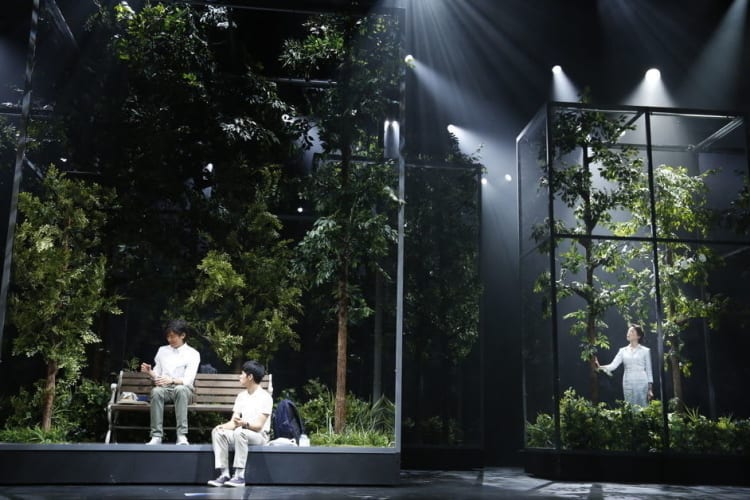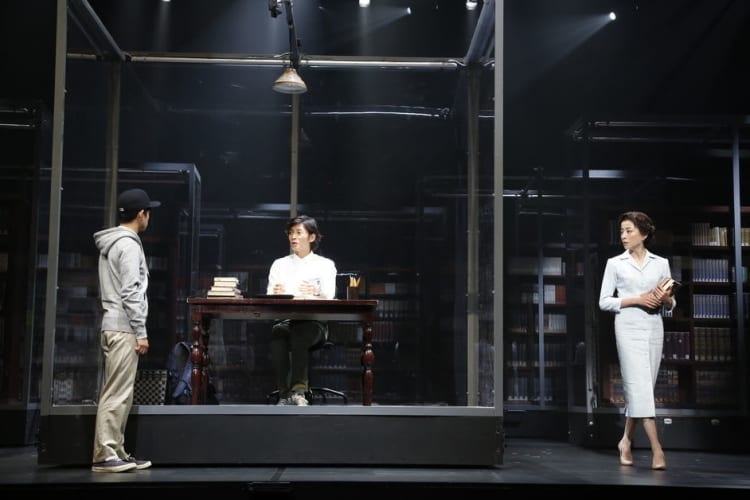Haruki Murakami is a fascinating writer though his books are often surreal novels can be quite difficult to interpret—John Updike described this one as "an insistently metaphysical mind-bender". Indeed its plot and complexities are far more than could be fitted into an ordinary length evening in the theatre.
This is not one but two intertwining stories. First there is a 15-year-old lad who chooses to call himself Kafka (Nino Furuhata) who runs away from home where he lives with his father to avoid a prediction like the one that cursed Oedipus.
Then there is the story of an old man called Nakata (Katsumi Kiba) who survived teenage exposure to what he believes was a great flash of light in the sky that left him unconscious for weeks. Though a teacher confesses it was a beating from her that caused brain damaged that took away memory and reading skills but gave him a new ability: he can communicate with cats.
Kafka, who has hopes he may find the mother and sister who left when he was little, finds his way to the island of Shikoku where, in a private library in Takamatsu, he gets given a job and a room. Oshima (Naohito Fujiki), the gentle librarian who befriends him is a female living as a man who likes men. Their superior Miss Saeki (Rie Miyazawa), a woman to whom Kafka feels strangely attracted, was in love with the son of the family who founded the library, their relationship ended by his death in an accident. Now Kafka sleeps in his room and dreams of Saeki.
Nakata supplements what support he gets from the state by looking for lost cats: currently a missing tortoiseshell. A big black cat he names Otsuka thinks he may have seen her. A Siamese who calls herself Mimi (Mutsukiko Doi) warns of a strange cat catcher while a brain damaged ginger kitten called Kawamura (Mame Yamada) plays beside them.
A dog (Takamori Teuchi) leads Nakata to the catcher who turns out to be a killer dressed up like Johnny Walker (off the whisky label) who himself wants to be killed and sets up Nakata to do it. Meanwhile Kafka wakes up in a wood to find his shirt drenched with blood and takes refuge with a girl he met on the bus to Takamitsu.
A confession the police won’t believe, a kind lorry driver called Hoshino (Tsutomu Takahashi) who takes to Nakata and helps him, a mysterious Colonel Sanders of fried chicken fame (Masakatsu Toriyama), two soldiers (Yukio Tsukamoto and Takamori Teuchi) who disappeared into the forest in the Second World War, a philosophising tart (Mitsukiko Doi) all come into the story, along with a stone that hides a gate out of time. Who is real, what is fantasy and whose fantasy is it?
This is a world, as Kafka’s alter ego Crow (Hayato Kakizawa) tells him, “where distance might not solve anything” and, though he wraps it up in elaborate metaphor, “you can’t escape yourself.” Murakami quotes Yeats: “In dreams begins responsibility,” and he presents life as a kind of labyrinth but, though Kafka may gain some kind of closure, he is not a writer to clarifying meaning. Is there something very deep he is trying to communicate or is this all just an intellectual game?
That is something to argue over, but its imaginative leaps and that game element match theatricality and make this a surprise packed dramatic entertainment.
Director Yukio Ninagawa is known for his style and his image making. With his designers Tsukasa Nakagoshi (set) and Ayako Maeda (costume), he has done it again.
The design consists of element in glass boxes—trees, office, library desk, bed, a lorry a bus, a row of urinals (though no scene is set there), even a tightly contained young Saeki—that are mounted on trucks and move around each other bringing a particular setting forward.
It is as though life takes place in lots of separate compartments yet they all interact with each other. At times, when at rest, they form life’s maze, but a maze that is constantly changing.
As usual, Ninagawa uses Western classical-style music and complex sound effects (Katsuji Takahashi) and stunning lighting, highly concentrated (Matoi Hattori). The technical achievement is considerable, not least by the crew that pushes the stage trucks around and it was good to see them too take a curtain call.
This is not just a technical achievement. This is a cast that delivers from the dumb kitten wanting its tummy tickled to the soldiers still in their wilderness decades after disappearing. Furuhata’s Kafka is beautifully paired by Kakizawa’s Crow, his calm inner voice, in every glance Miyazawa’s Saeki conveys feeling, at the same time loving and distant. Fujiki’s kind Oshima makes you want to know his whole story, Takahashi’s Hoshino could not be more real and Kiba’s Nakata‘s enchanting, a delight to watch every moment.
Frank Galati’s adaptation makes things seem simpler than the novel with its tightened storyline while still leaving the audience to sort out what it is all about. Ninagawa’s production is so theatrically engaging—even its slow gliding scene change is mesmeric—that even if you are still left wondering what Murakami is saying you will have a satisfying three hours of theatre.

